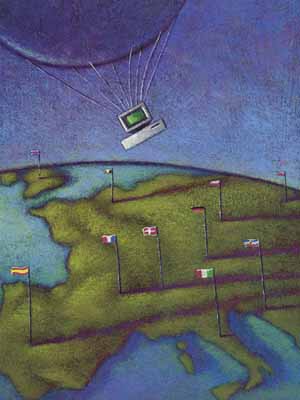

by Lori Bona Hunt
| When he was a graduate student in medical informatics,
Dr. Peter Huber MS'96 liked to stand at the top of the University Hospital's
parking terrace at sunset. With an expansive view of the campus, downtown
Salt Lake City, and the Great Salt Lake, he'd watch the valley glow until
the sun sank behind the Oquirrh Mountains.
It was during these sunsets that Huber made a decision. After he returned to his native Germany, he would find a way to stay connected to the U. "As I would look out over the campus and city, I just felt it was a very nice place, a clean, safe place. I thought Salt Lake was as close to Europe as I could be," Huber says during an interview from his home in Germany. Now, thousands of miles away at the University of Cologne's Department of Surgery, Huber has found a way to remain in touch with the school he considers his alma mater. He has become a member of the International Resource Network. (Dr. Huber returned to the campus in October to attend an organizing and planning meeting for the network.) The network was created to build bridges between the U and its international students, scholars, and alumni. Now, by calling up the network on his computer via the Internet, Huber can keep tabs on U of U friends and colleagues, whether they are in Uruguay or Australia. He can seek out other former students and teachers living in Germany, keep on top of alumni activities in Utah, and be a contact for German students hoping to study at Utah. He also may serve as a mentor for U of U students who are in Germany participating in exchange programs. Huber has written letters to dozens of former U students and scholars from Germany he has never met, urging them to join the network. "I just liked the school so much and the way the students were treated. There was an openness to all kinds of people from different countries and cultures," he says. "That is why I support the network." He is not alone. More than 400 people from around the world have become members, eager to maintain a tie with the U. It does not matter if they are alumni, a student who studied here only a year, or a past visiting scholar or researcher, says Isabel Sharp, network coordinator. They all share a common bond. "They come from very far away to go to school here. They value the educational experience so much, they want to remain connected." Thousands of people, representing more than 130 countries, have come to the University for education, teaching, and research. Staying in contact had been a challenge. "It had been a very frustrating experience to try and maintain any kind of ties at all with alumni and others overseas. We didn't ever feel we were making any progress," says William Barnhart, who directs the University's International Center, host office for the network. Adds Sharp: "We knew they were out there, the key was finding them. They are sort of lost in space all over the world." Barnhart and Sharp started the network last winter and hoped to have 30 to 50 members by the end of the first academic year. But the response was overwhelming. There now are more than 400 members. The network has its own Web page, complete with a discussion/announcement list, and publishes a newsletter both online and in printed format. Internationally, anyone with a U connection is invited to join. "Our numbers are increasing every day; we are just elated to see such interest," Sharp says. "It really is far more successful than we ever anticipated it might be," notes Barnhart. In the early stages of planning the network, Sharp was surprised to learn a large number of people in Korea with Utah ties already had formed an informal alumni association. With the help of some Korean students on campus, she wrote a letter in Korean asking the group to align itself to the network. She received more than 100 members almost instantaneously. Other network members span the globe, including Egypt, Israel, Brazil, Argentina, China, Bangladesh, Taiwan, Hungary, Poland, India, Japan, Canada, Kenya, Russia, Thailand, Norway, Singapore, and Mexico. "Many of the people who come here from a different culture place a higher value on the institution than we do as Americans," Barnhart says. "They adopt Utah as their second home. They are very proud of the fact that they attended the U, taught, or did research here. They appreciate any opportunity to stay connected." |
The network's benefits are many. Members may set up student, faculty, and professional exchanges, research and internship possibilities, expand study abroad programs, explore international business opportunities, and form ties in a global economy. "I think it's realistic to say its potential is limitless," Barnhart says. "What it does is establishes a true international perspective." The network also works with people interested in forming associations in countries where there are a substantial number of people with Utah ties. "Very often these international students, once they go home or to a third country, move very rapidly up the ranks in business and government," says Sharp. "That is an important resource for the U." Dr. Alvaro Margolis MS'95 hopes the network will be a resource for his country and university as well. A professor at the Universidad de la Republica in Uruguay, Margolis was a graduate student in the same medical informatics program as Huber. While his university is much larger than the U (about 50,000 students) and the country's population is highly educated, it is economically disadvantaged. Students have fewer opportunities. "I would like to develop a community of students who study (at the U) then come back, as I did, and bring their knowledge here," Margolis says during an interview from the Uruguayan hospital where he works. He also hopes network members will come to his university as guest lecturers and set up exchanges of information and resources. That is vital for a financially strapped university. "Knowing those people and where they are is important," he asserts. "They are very good links for us scientifically." Back in Utah, students about to leave for international study stop by the International Center almost daily to join the network. Students who go abroad often go into professions overseas and become valuable contacts for the U in the business world, Sharp says. In turn, international students who study at the U and then return to their native country provide important connections. That is what Loic Monguillon MS'96 has discovered. Monguillon, a French student who came to the U to do graduate work in environmental engineering, accepted a job in Singapore. He has no friends or family there. "In fact, it took me 10 minutes to locate exactly where I was going on the map," he confesses. But through the network, he found a former U student living in Singapore. "I'm tempted to call her as soon as I get there," he says. "Once I make that first contact, I think I'll continue to meet people." Monguillon eventually plans to return home to France. Through the network, he plans to find French students interested in studying abroad and direct them to the U of U. He also hopes to assist U students studying in France, and set up an alumni association. "Even if I get calls from students 10 to 15 years from now, I'd be happy to help," he says. "I love Utah, I feel comfortable here. I'm very, very proud to be an alum of the University." Monguillon chose Utah at random. As a child, he played "cowboys" with friends and always dreamed of coming to the Old West to study. After he completed his undergraduate education, "I closed my eyes and put my finger on the map of the western United States. I ended up in Salt Lake." Now he considers Utah his second home. He also plans to stay in contact with his international classmates through the network. "I hope to come back here some day, when I have a wife and kids, to show them this part of my life," Monguillon says. "Because I come from a different place, a different educational system, I have a greater appreciation for the University than people who live here every day might." For Huber, the desire to stay connected comes back to those sunsets. Go to the top of the hospital's parking terrace, he says. Look out over campus and watch the sun go down. You will understand why he wants the U to remain a part of his life. For additional information on the International Resource Network, contact Isabel Sharp at 801-581-8876. |